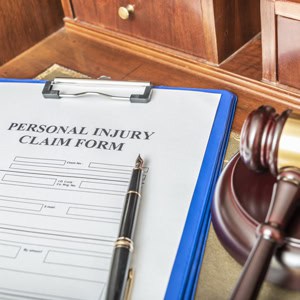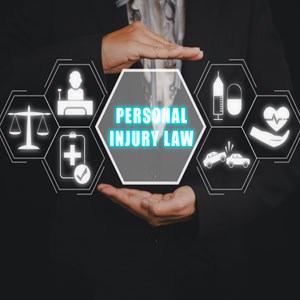
If you’ve been hurt in an accident in Maryland—whether it was a car crash, a slip and fall, or another type of injury—you might be wondering: Do I have to go to court to get compensation?
The short answer is: not always. Most personal injury cases in Maryland are settled outside of court. But sometimes, going to trial is necessary to get the justice you deserve.
At The Bishop Law Group, our Baltimore personal injury lawyers help injured clients across Maryland understand their legal options and make informed decisions. This blog will explain how personal injury cases work in Maryland, when you might have to go to court, and what to expect if you do.
What Is a Personal Injury Case?
A personal injury case happens when someone is hurt because of another person’s carelessness or wrongdoing. Common examples include:
- Car accidents
- Slip and fall injuries
- Medical malpractice
- Dog bites
- Workplace injuries
In Maryland, the injured person (called the plaintiff) can ask for money to cover things like medical bills, lost wages, and pain and suffering.
For a free legal consultation, call (410) 390-3101
Do Most Personal Injury Cases Go to Court?
The Statistics
In Maryland, over 90% of personal injury cases settle out of court. That means the injured person and the other side (usually an insurance company) agree on a payment amount without going to trial. Only 3% to 5% of cases end up in court.
Why Do Cases Settle?
Settling a case is usually faster, less expensive, and less stressful than going to trial. It also gives both sides more control over the outcome. Trials can take months or even years, and there’s no guarantee of winning.
When Might You Have to Go to Court?
Even though most cases settle, there are times when going to court is the best option. You might have to go to trial if:
- The insurance company denies responsibility
- They offer a low settlement that doesn’t cover your costs
- There are disagreements about how badly you were hurt
- You want to hold the other party publicly accountable
- In these cases, your lawyer may recommend filing a lawsuit and preparing for trial.
Click to contact our lawyers today
What Happens if You Go to Court?
Step 1: Filing the Lawsuit
Your lawyer will file a complaint in court. This document explains what happened, who is responsible, and what damages you’re asking for. The person or company you’re suing (called the defendant) will be served with the lawsuit and given time to respond.
Step 2: Discovery Phase
Both sides exchange information and evidence. This includes:
- Medical records
- Accident reports
- Witness statements
- Expert opinions
You may also be asked to give a deposition, which is a recorded statement under oath.
Step 3: Settlement Talks
Even after a lawsuit is filed, you can still settle. Many cases settle during or after the discovery phase. Lawyers may negotiate directly or use mediation, where a neutral third party helps both sides reach an agreement.
Step 4: Trial
If no settlement is reached, the case goes to trial. A judge or jury will hear both sides and decide:
- Who is at fault
- How much money (if any) the injured person should receive
Trials can last a few hours (in District Court) or several days (in Circuit Court), depending on the case.
Step 5: Appeals
If either side disagrees with the verdict, they may appeal to a higher court. Appeals can take months and are usually based on legal errors made during the trial.
Complete a Free Case Evaluation form now
What Are the Pros and Cons of Going to Court?
Pros
- You may get more money than the insurance company offered
- You can hold the other party publicly accountable
- A jury may be more sympathetic to your situation
Cons
- Trials take longer than settlements
- They can be stressful and emotional
- There’s no guarantee you’ll win
- Legal costs may be higher
Maryland Law: Important Things to Know
Statute of Limitations
In Maryland, you have three years from the date of your injury to file a lawsuit. If you wait too long, you may lose your right to sue.
Contributory Negligence
Maryland uses a strict rule called contributory negligence. If you are even 1% at fault, you may not be able to recover any money.
For example, if you were texting while walking and slipped on a wet floor, the court might say you share some blame—even if the property owner was mostly at fault.
Do You Need a Lawyer?
You’re not required to have a lawyer, but personal injury law can be complicated. A lawyer can:
- Help you understand your rights
- Gather evidence
- Negotiate with insurance companies
- Represent you in court
Most personal injury lawyers in Maryland work on a contingency fee, which means they only get paid if you win your case.
Real-Life Example: Settlement vs. Trial
Let’s say you were injured in a car accident in Baltimore. The other driver’s insurance company offers you $10,000. But your medical bills are $15,000, and you missed two months of work.
Your lawyer advises you to reject the offer and file a lawsuit. During discovery, you provide strong evidence of your injuries and lost wages. The insurance company then offers $25,000, and you accept.
In this case, you didn’t go to trial—but filing the lawsuit helped you get a fair settlement.
Conclusion
So, do you have to go to court for a personal injury case in Maryland?
Not usually. Most cases are settled out of court. But if the other side won’t offer a fair amount, going to trial may be your best option.
Here’s what to remember:
- Most cases settle—only 3–5% go to trial
- Trials take longer but may result in higher compensation
- Maryland law is strict—especially the contributory negligence rule
- You have three years to file a lawsuit
- A lawyer can help you decide whether to settle or go to court
Need Help? Contact The Bishop Law Group
If you’ve been injured and are unsure whether you need to go to court, The Bishop Law Group is here to help. Our experienced personal injury attorneys will guide you through every step of the process—from negotiating with insurance companies to representing you in court if needed.
We understand Maryland’s strict laws and will fight to protect your rights and maximize your compensation.
Let us help you make informed decisions and get the justice you deserve. Schedule a free consultation today.
Call or text (410) 390-3101 or complete a Free Case Evaluation form





